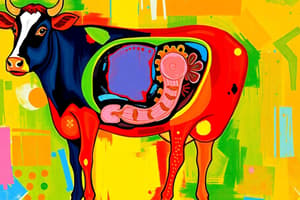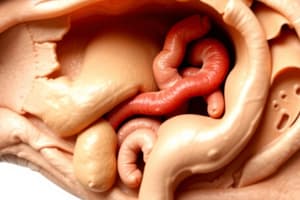Podcast
Questions and Answers
Which of the following statements about platypuses is true?
Which of the following statements about platypuses is true?
- They have a traditional stomach like other mammals.
- They are considered reptiles due to their egg-laying ability.
- They lack venomous spurs and are classified as marsupials.
- They are mammals that lay eggs and have venomous spurs. (correct)
Which of the following is NOT one of the four major tasks accomplished by the human digestive system?
Which of the following is NOT one of the four major tasks accomplished by the human digestive system?
- Ingestion
- Elimination
- Digestion
- Respiration (correct)
Where does significant chemical digestion of all biomolecules occur in the human digestive system?
Where does significant chemical digestion of all biomolecules occur in the human digestive system?
- Small intestine (correct)
- Stomach
- Mouth
- Esophagus
Which of the following statements about the large intestine is NOT true?
Which of the following statements about the large intestine is NOT true?
Which of the following organs does NOT play a crucial role in the digestive system by releasing digestive juices and enzymes?
Which of the following organs does NOT play a crucial role in the digestive system by releasing digestive juices and enzymes?
Which of the following disorders can impact the function of the digestive system?
Which of the following disorders can impact the function of the digestive system?
Flashcards are hidden until you start studying
Study Notes
- Platypuses are unique mammals known for laying eggs and having venomous spurs on their legs.
- Platypuses are considered to not have a stomach in the traditional sense, challenging common notions of digestion in mammals.
- The human digestive system accomplishes four major tasks: ingestion, digestion, absorption, and elimination.
- Ingestion starts in the mouth, where both chemical (enzymes in saliva) and mechanical (teeth grinding) digestion occur.
- Peristalsis helps move food down the esophagus to the stomach, where chemical digestion with gastric juices (HCL and pepsin) takes place.
- The small intestine is where significant chemical digestion of all biomolecules occurs, aided by enzymes and digestive juices from organs like the liver and pancreas.
- Nutrient absorption mainly occurs in the small intestine through villi and microvilli, which provide a large surface area for absorption.
- The large intestine's major role is water reabsorption, while harmless bacteria present help with vitamin synthesis and feces formation.
- Accessory organs like the liver, gallbladder, and pancreas play crucial roles in the digestive system by releasing digestive juices and enzymes.
- Various hormones regulate digestion, and disorders like celiac disease and heartburn can impact the function of the digestive system.
Studying That Suits You
Use AI to generate personalized quizzes and flashcards to suit your learning preferences.




